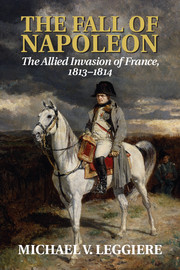Book contents
- Frontmatter
- Dedication
- Contents
- List of Illustrations
- Preface
- 1 The New Charlemagne
- 2 Barbarians at the Gate
- 3 The Frankfurt Proposals
- 4 Napoleon and the French
- 5 The Left Bank
- 6 The Right Bank
- 7 The Lower Rhine
- 8 The Upper Rhine
- 9 The Middle Rhine
- 10 Alsace and Franche-Comté
- 11 The Vosges and the Saône
- 12 Lorraine
- 13 The Saar and the Moselle
- 14 Belgium
- 15 The Marne
- 16 Bourgogne, the Rhône, and the Aube
- 17 The Protocols of Langres
- Appendices
- Bibliography
- Notes
- Index
16 - Bourgogne, the Rhône, and the Aube
Published online by Cambridge University Press: 05 February 2015
- Frontmatter
- Dedication
- Contents
- List of Illustrations
- Preface
- 1 The New Charlemagne
- 2 Barbarians at the Gate
- 3 The Frankfurt Proposals
- 4 Napoleon and the French
- 5 The Left Bank
- 6 The Right Bank
- 7 The Lower Rhine
- 8 The Upper Rhine
- 9 The Middle Rhine
- 10 Alsace and Franche-Comté
- 11 The Vosges and the Saône
- 12 Lorraine
- 13 The Saar and the Moselle
- 14 Belgium
- 15 The Marne
- 16 Bourgogne, the Rhône, and the Aube
- 17 The Protocols of Langres
- Appendices
- Bibliography
- Notes
- Index
Summary
Diplomatic posturing and increased political activity directly affected Schwarzenberg's operations during the second half of January. In addition to Russian and Prussian opposition, London's insistence on Holland's acquisition of Belgian territory and in particular Antwerp meant the Frankfurt Proposals no longer held prominence in Allied councils. Moreover, the future frontiers of France and “Germany” remained unclear. “Therefore, to return to the principal question,” Metternich explains to Schwarzenberg. “I will tell you peace must be concluded in less than fifteen days and at the very most in three weeks or indeed the Coalition must propose a new goal. That which had formed the basis of our previous arrangements has been achieved and nothing is worse for an alliance than ambiguity.”
To spare France a draconian peace that would cripple its ability to counter Russia, the Austrian minister hoped to end the war as soon as possible. A decisive victory over the French army in either Lorraine or Champagne that would embolden Alexander and the war party threatened his intricate plans. Metternich enjoyed a great advantage over Alexander in their expanding cold war. The war party could never be certain of Metternich's next move, yet the wily statesman effortlessly divined the tsar's actions and reactions. He understood that a major French defeat on the battlefield would increase the tsar's demands and make peace both more difficult to attain and less advantageous to Austrian interests.
- Type
- Chapter
- Information
- The Fall of Napoleon , pp. 492 - 533Publisher: Cambridge University PressPrint publication year: 2007



